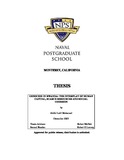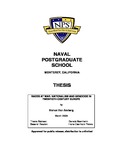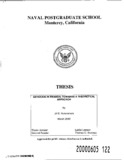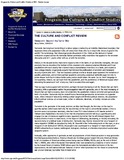Genocide in Rwanda : the interplay of human capital, scarce resources and social cohesion
| dc.contributor.advisor | McNab, Robert | |
| dc.contributor.advisor | Looney, Robert E. | |
| dc.contributor.author | Mohamed, Abdul Latif | |
| dc.date.accessioned | 2012-03-14T17:47:59Z | |
| dc.date.available | 2012-03-14T17:47:59Z | |
| dc.date.issued | 2003-12 | |
| dc.identifier.uri | https://hdl.handle.net/10945/6165 | |
| dc.description.abstract | In 1994 the Rwandan genocide stunned the international community. The brutality of its execution was incomprehensible and defied one's wildest imagination. Many authors contend that ethnic extremism coupled with political manipulation were the primary factors behind this tragedy. Yet to oversimplify the cause of this tragedy makes one blind to the complicated nexus that generated the outcome. Even though this genocide was quick in its execution, the events that lead to this massacre took years to unfold. The first violent clash between the Hutu and the Tutsi began in 1959. Historically the relationship between Hutus and Tutsis was harmonious until the advent of Belgian colonialism, which imposed a system that benefited the Tutsi and victimized the Hutu. The Hutu disaffection with the system did not immediately translate into conflict. It was only when they were educated about their misfortunes and inequities that they rose up violently against the injustice. Unfortunately , they perpetrated a ghastly butchery of innocents. The nature of the Rwandan society where people lived close to each other, knew their neighbors very well, and had an element of blind obedience toward the authority served the agenda of the genocide perpetrators. These factors when compounded with intense competition for limited resources eventually led to the aforementioned tragedy. | en_US |
| dc.description.uri | http://archive.org/details/genocideinrwandi109456165 | |
| dc.format.extent | xvi, 113 p. : col. maps ; | en_US |
| dc.publisher | Monterey, California. Naval Postgraduate School | en_US |
| dc.rights | Copyright is reserved by the copyright owner. | en_US |
| dc.subject.lcsh | Genocide | en_US |
| dc.subject.lcsh | Rwanda | en_US |
| dc.subject.lcsh | Sociological aspects | en_US |
| dc.subject.lcsh | Tutsi (African people) | en_US |
| dc.subject.lcsh | Hutu (African people) | en_US |
| dc.title | Genocide in Rwanda : the interplay of human capital, scarce resources and social cohesion | en_US |
| dc.type | Thesis | en_US |
| dc.contributor.corporate | Naval Postgraduate School (U.S.) | |
| dc.contributor.department | National Security Affairs | |
| dc.description.service | Major, Royal Malaysian Air Force | en_US |
| etd.thesisdegree.name | M.A. in Security Studies (Security Building in Post-Conflict Environments) | en_US |
| etd.thesisdegree.level | Masters | en_US |
| etd.thesisdegree.discipline | Security Studies (Security Building in Post-Conflict Environments) | en_US |
| etd.thesisdegree.grantor | Naval Postgraduate School | en_US |
| etd.verified | no | en_US |
| dc.description.distributionstatement | Approved for public release; distribution is unlimited. |
Files in this item
This item appears in the following Collection(s)
-
1. Thesis and Dissertation Collection, all items
Publicly releasable NPS Theses, Dissertations, MBA Professional Reports, Joint Applied Projects, Systems Engineering Project Reports and other NPS degree-earning written works.





